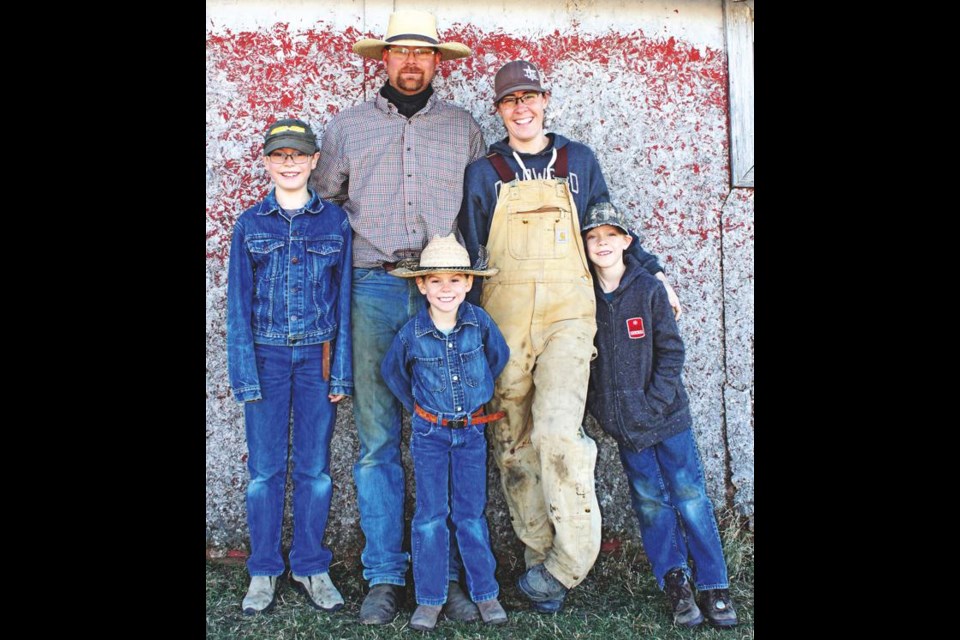For a local farm family, raising children is a daily adventure where farm safety is an integral part of life around animals and machinery.
Ray and Codee Kyle live on a farm near Tyvan, and are raising and home-schooling three children, ranging in age from five to nine years old.
The family lives in staff accommodations on the Blade Young ranch, where Ray is a full-time ranch hand, and Codee home-schools her children, who include sons Tanner (9) and Kipton (8), and daughter Macee (5).
Over the 10-plus years they have lived there, the family has gradually increased the number and types of animals they are raising. Today they have horses, 15 head of Angus and Charolais cattle for beef, a milk cow, four goats for milk and chickens.
“Farm safety is important because you have to be way more aware when you have infants around,” said Codee. “The kids know the rules as they’ve gotten older, and I don’t feel the need to watch them quite as much.”
Awareness of safety is an integral part of farm life, she noted, as when they are explaining what chores need to be done or how, they talk about what they should or should not do in a given circumstance.
“A huge part of it is watching. Our kids do a lot with us, as they do quite a bit with us, so I would say it’s like learning on the job for a lot of things,” said Codee.
An example is when they’re around horses, which Ray uses in his work on the Young ranch, she said, as they will point out that they shouldn’t get too close to the horse’s back legs or be too loud and rambunctious around them.
Another area for safety is being around cattle, both their head and the cattle that belong to the Young ranch. Codee noted that a couple of weeks, some cattle got out into a neighbour’s field, and Ray put them back into the right pen.
When he came home for supper that day, he pointedly told the children to be careful not to touch the fence wires, as they were electrified to help discourage the cattle from trying to get out.
“That was a huge thing to know, because it’s not always electrified,” said Codee, adding they also use some machinery on the farm.
“I had a lady tell me once she tells kids to always make eye contact with the driver. Our kids seem to do that pretty well,” she said. “As parents, we still have to watch out for them, because we don’t own this property. There can be deliveries and people coming into the yard who are not us, so our kids have to be aware that people could come into the yard.”
Asked if there were any other areas they watch out for, son Tanner yelled out, “Don’t climb on machinery!”
His prime area of responsibility are the chickens, as he gathers and sells the eggs as his source of income, and he noted there are safety aspects he has to keep an eye on. For example, he makes sure the chickens are locked up in the coop at night, and the dog is also, as there are coyotes around the area.
“I collect eggs from the nesting boxes, and I write down the date of the oldest eggs in the carton, and we sell them on our Facebook page,” said Tanner, noting he charges $4 a dozen, and they deliver them to homes or in town when they come in to Weyburn.
For Macee, an area she’s learned about safety is around their horse, Red. She’s learned that to be safe, she has to wear a helmet (she’s had the experience of falling off the horse), and to wear jeans and cowboy boots while riding.
Even being out walking in the area brings up the importance of being safe, noted Codee. They go and check a grove of trees on the Young ranch every day as they collect sap from maple trees there, but they have to take care on the road as there is a lot of traffic on it.
“Sometimes when people drive by, they just whiz by and don’t really pay attention,” said Codee, to which Tanner added, “We have to stay inside the fence line.”
These days, staying safe also means being aware of COVID, and Codee notes they keep trips into Weyburn or Fillmore to a minimum. This is particularly true in the spring when they have so much to do around the farm, but it helps to keep contact with other people to a minimum as a result.



